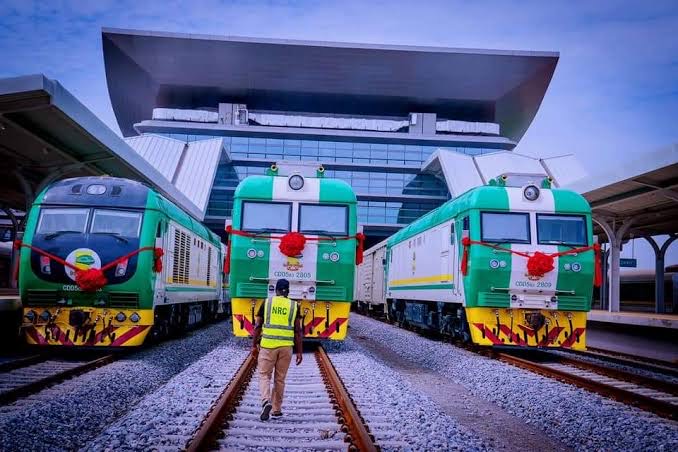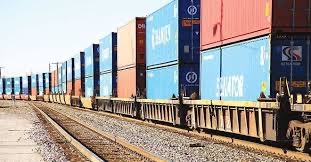Despite an investment of over $1.5 billion in the construction of the Lagos-Ibadan standard gauge railway, the movement of import and export goods to and from the hinterland remains low.
According to the National Bureau of Statistics (NBS), while the movement of goods by rail across the country has shown some improvement, the volume is still low compared to the total volume of goods handled annually at the country’s ports, meaning that the bulk of Nigeria’s imports and exports are still carried out by road.
The Secretary-General of the Nigerian Shippers’ Council, Pius Akutah, said, “Lack of a functional rail system to move cargo to the hinterland has been impeding the ease of doing business and resulting in congestion at the seaports, delays vessel discharge, and increases turnaround time for ships”.
According to Akutah, this forces exporters and importers to pay high demurrage fees and also results in trucks and tankers clogging roads, causing traffic congestion.

A total of 1,566,162 million 20 equivalent unit containers were brought into Nigerian ports in 2023, according to data from the Nigerian Ports Advisory Council. However, former Port Manager of Lagos Port Charles Okaga said that about 10,000 TEU shipments were recorded in the first half of 2024, up from 9,000 shipments in 2023.
This indicates that only about 0.6% of all containers brought into the country each year are transported by rail.
As reported by NBS, a total of 317,244 tonnes of goods were transported by rail across Nigeria in 2023, up 144.32 tonnes compared to 157,024 tonnes transported by rail in 2022.
In tonnes, the 2023 volume represents 0.5% of the total cargo throughput imported in 2023.
As stated by NBS rail transport data, rail freight volume in the first quarter of 2024 was 160,650 tonnes, compared with 59,966 tonnes recorded for the same period in 2023. Similarly, N607.32 million was collected for rail transport of goods, up 235.03 percent compared to N181.27 million collected in the same period in 2023.
Reporters found that there are several reasons why rail is significantly underutilized for transportation. The reasons range from technical reasons to cost to low acceptance among shippers.
NRC Head of Operations and Commercial Services, Akinwunmi Oshilowo, said at a recent stakeholder meeting that the track has been badly vandalized by hoodlums.
Oshilowo said there is no clear jurisdiction between the rail track and the port as NRC locomotives continue to have problems accessing the port due to too many trucks clogging the rail right-of-way at the Apapa Bulk Terminals Limited (ABTL) section of the Apapa port.
“The NRC didn’t have enough Marshaling Yards inside the ports making it a nightmare to bring locomotives into the APM Terminals in Apapa. The corridor through which we navigate into the ports, which is located at ABTL terminal is too narrow and always congested with trailers,” he said.
This, he said, leads to accidents where trains trying to enter the port collide with trailers along the Apapa corridor, ultimately blocking rail traffic within the port.

He said one of the main reasons why trains cannot reach the rail line at Greenview Development Terminal at the port’s wharf is the continued vandalism of the port’s tracks and facilities.
An effective and functional rail system is essential for the growth of inland dry ports. The project is being promoted by the Nigerian Shippers Council to decongest ports and bring port business closer to users.
Akuta said countless thefts of rail cargo have occurred on the Lagos-Kaduna, Kaduna-Zaria, Zaria-Funtua, and Kano routes, delaying the commencement of rail freight movement to and from hinterland ports. He said the use of the train system is crucial for cost efficiency, risk mitigation, and overall management of the dry port.
Meanwhile, the Managing Director of the Nigerian Railway Corporation, Fidet Okhiria, said Nigerian importers and exporters are apathetic to using the railway.
This was evident in the recent shipment of 17 containers from Apapa Seaport to Dara Inland Dry Port in Kano, where the NRC took a long time to retrieve the 17 containers.
He said the Nigerian Manufacturers Association came together to transport goods in bulk, which is cost-effective and allows finished products and raw materials to reach factories at cheaper rates.
The 157-kilometre Lagos-Ibadan Standard Gauge Railway was inaugurated on June 10, 2021, with passenger services from Lagos to Moniya, Ibadan commencing immediately on June 15 of the same year. The rail line was commissioned by then President Muhammadu Buhari without a contractor, China Civil Engineering Construction Company Limited (CCECC) Nigeria Limited, which had completed the laying of the track to Apapa Port when it struck the wall of APM Terminal, a container terminal in Apapa.
It was then discovered that the inspection building of the Nigerian Customs Service (NCS) and its inspection bays, built some years ago under the Destination Inspection Scheme, were in the way of the track.
The issue was resolved on September 23, after which container traffic on the rail line commenced.
































